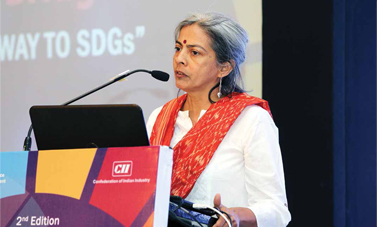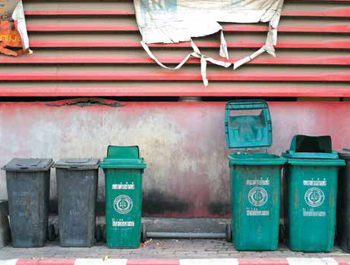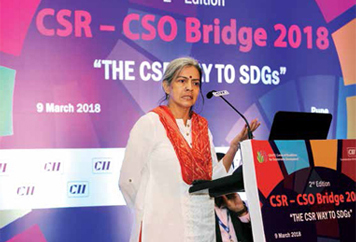Aligning CSR policy to the UN’s sustainable development goals (SDGs) is a huge change project and needs inputs across the organisation and buy-in at the executive level. SDGs are about achieving development goals from an economic, social and environmental perspective. With this background, Confederation of Indian Industry (CII), Pune jointly with CII-ITC Centre of Excellence for Sustainable Development (CESD) organised the second edition of CII CSR-CSO BRIDGE 2018 CONCLAVE, with an aim to identify and share practical, evidence-based solutions that can support the SDGs. In her special address in the inaugural plenary, Lakshmi Narayanan, founder-secretary, Kagad Kach Patra Kashtakari Panchayat (KKPKP) talked about KKPKP’s efforts and initiatives how everyone can play a major role in driving a more sustainable, prosperous and inclusive society. Corporate Citizen brings you the excerpts from this special address

I represent the trade union of waste pickers, called the ‘Kagad Kach Patra Kashtakari Panchayat’ (KKPKP), which is now 25 years old, this year. We started in the year 1989, organising and talking to waste pickers, trying to impress upon not just municipality and citizens, but among the waste pickers themselves, that what they are doing is an important work.
Twenty-five years back, when you asked a waste picker what work she did, she would say I do nothing. And if you asked them, how do you earn, and how do you survive, she would say, waste-picking. It was not considered work even by them and we felt not only it is economically productive because it is giving them a livelihood, it’s filling their stomachs and providing for their families. It’s also mitigating climate change in a very significant way, because they divert recyclable waste from the landfill. They are actually ensuring that it gets recycled— they are conserving scarce and natural resources. In very real terms, their work means 20 per cent of the waste gets diverted from the landfill. As tax payers we pay the municipalities to collect our waste, so every waste picker is actually contributing directly in terms of unpaid labour to reduce municipal solid waste-handling cost. So, the argument was, this kind of work that is environmentally valuable, socially useful, it offers them a livelihood—needs some kind of recognition and we chose to register the organisation as a trade union, to establish to everyone, including ourselves that this is a productive work.
Waste picking in traditional form, you see women go around with sacks, rummaging through bins and getting cut in the process. Certainly that is not an identity and that is not the kind of work we want to encourage, but we feel that waste collection, segregation and retrieval, if their work terms were enhanced—it’s actually a much better paradigm of waste management.
In many countries including India, our municipalitis, and our government are under tremendous pressure to solve waste management problems by simply adopting Western models that neither suit our economy, nor suit our waste characteristics, nor suit the kind of labour we have. And when we can actually develop far more robust structures here that can address the issues then why we are not trying to do that? So, that was where we started from—we believe strongly that waste pickers, as all urban poor, are very intelligent and articulate people. There is a systemic reason for poverty—nobody is poor because they are lazy, don’t want to work or they are unintelligent.
We felt that we need to understand waste picking, so 25 years back we ourselves also took sacks and went waste picking with them, to try and see what kind of conditions they face, what issues they have, what their language skills were—obviously, the woman who is collecting 50 to 100 kilo of different kinds of waste that vary in rate from one rupee a kilo to 25 rupees a kilo, would be able to make some calculations, because she is selling her material daily, at the end of the working day.
"We are registered as a trade union; waste pickers had to pay a membership fee and that made us accountable to them. So, they had every right to turn around and expect us to address their issues and the issues were therefore defined by what they said was important"

Then we tried to develop a curriculum of literacy for their children, because many of their girl children wanted to learn to read and write. Many children, 25 years ago, obviously were not in school—mothers use to openly say, “What is the use of educating my children. If they are educated, they will not even collect waste.” And we had examples—we had children in the community, youth who were graduates, Dalit slum kids who were educated by their waste picker parents to be graduates and even postgraduates, but were jobless. Their education made them too embarrassed to collect waste. Their mothers would say that even after educating my child, I have to continue to work, while uneducated children are ready to collect waste. It was a very hard argument to counter, because there is some truth to what they are saying and how do you expect a sixty-year-old woman to continue collecting waste, because her younger son is too educated to do the work and has no employment opportunities either.
Today, KKPKP has a strong education programme and the strength of education programme is not only the scholarship that we manage to get from the government or the private sector, for the children of waste pickers, but also the fact that every waste picker today believes that their child should go to school, believe that they should have the first right of refusal whether they have to work in waste or not. And lot of the staff of Swachh and KKPKP activists, accountants, data managers are actually children of waste pickers. So, we ensure that children of waste pickers are given the first right of refusal, as far as work is concerned. In terms of starting activities, initiatives, programmes, we always rely on the intelligence of waste pickers. Simply because we don’t think any programme is really going to succeed or work well, unless it’s really relevant and they are the best people to decide if anything is really well.
Twenty-five years ago we started arguing about what is the legitimacy of work, then bringing together the waste pickers, we argued that the municipalities should give them identity cards, should recognise them as very important element in the waste management scenario. Even if the municipality doesn’t give them wages, their work is contributing to the municipal cost, the municipality should at the very minimum authorise them by issuing identity cards. That is the first step; once they gave identity cards, we argued, what is the use of the identity card, if you don’t look at their health? We are sacrificing our health to keep your city clean, so the minimum you should do is, cover us under an insurance programme. The municipality bowed under pressure and we also did research to actually quantify the economic returns to the municipality due to work of the waste pickers and based on that the municipality agreed to cover the waste pickers under an insurance cover, where the municipality pays the premium.
The other thing we argued once identity and insurance cover was given, that you are calling us a waste picker, but unless we have access to the waste, what’s the point of an ID card? You are protecting our health, because we are handling the waste, but unless you protect our access to waste, what is the idea? So, instead of privatising waste collection to any entity which is likely to come in and hire urban poor and not pay them minimum wages and marginalise that, why not allow a waste pickers cooperative to do the first work of waste collection. Don’t privatise and outsource to any other entity; privatise and outsource to an entity of waste pickers. So, we convinced the municipality to set up Swachh, which is an autonomous cooperative of waste pickers, which has a slightly unique pro-poor private-public partnership of the municipality.
So, the municipality takes the Swachh management and overhead costs, for ensuring 5,000 waste pickers to go house to house and collect waste from the citizens. Today, we are servicing 600,000 households. This model has been in existence a little over 10 years now and I think the municipality recognises that there is no model in the country or in the world, which offers as no cost to the municipality for waste collection. What the municipality pays Swachh is only the overhead cost, so the staff of around 150 people who are organising the 5,000 waste pickers that they go around with services for citizens, their cost is covered by the municipality and that is how the partnership works. So, what the municipality pays directly for waste collection in Pune, comes to less than two rupees, per household, per month. So, the cost is less than tenth of the average cost across other municipalities.
We started this Swachh model 10 years back after first five-year period of working closely with the municipality. We started questioning our own approach—we wanted to prove it can be done, we wanted to prove that a waste pickers’ cooperative can be as efficient, as professional, as capable, as any private-sector group in managing waste collection. But, at the end of five years we started feeling that if the municipality is not going to treat this as an entity which is professional, not going to pay up on time, and is expecting us to subsidising the cost of municipality in handling its waste management function, which is the core municipal responsibility, why should we use the city’s poorest people to subsidise municipality. So, for two years we refused to take on the work, unless the municipality re-signed the contract with us. The waste pickers continued work on the ground, but the superstructure of Swachh was not working at that time. And we decided we will not renew the contract, unless the municipality not only pay the arrears, the amount they owed to Swachh in the first five-year contract, but also they give us a revised contract which addressed some of the other issues Swachh was facing. So, we now have a new five-year contract, which is two-year-old now.
 (Image is for representation purpose only)
(Image is for representation purpose only)We are registered as a trade union and we felt very strongly that every waste picker should pay to become a member of the union. We expected every waste picker to contribute to pay us subscription to become a member of the union. Twenty-six years ago that amount was Rs.13, one rupee was entry fee and 12 rupees per month. It was not a very small amount 25 years ago. Some waste pickers earned that much per day, some earned much more. But, we stuck to that for many reasons. One we just didn’t want to register just an NGO. We want a group that would be accountable to the waste pickers. It’s very easy to set up an NGO which finds its own goals and moves ahead, because it is taking forward the vision of few people.
We felt, if we really want to address the issues the waste pickers face, they have to be a part of our process and they can only be that in a member-based organisation. We registered as a trade union; they had to pay a membership fee and that made us accountable to them. So, they had every right to turn around and expect us to address their issues and the issues were therefore defined by what they said was important. So, 25 years ago also we were aware that waste management practices needed to change. We were educated, we were watching television, we were reading articles from outside, we knew about the need for segregation of waste. And we tried to convince waste pickers to engage in segregation of waste and promoting that among housing societies in certain elite parts of Pune.
Ten years down the line the membership fees have increased; you have to not only pay membership fee for this year, but arears of 25 years. The old waste picker members pointed—because it is our blood and sweat that has made the organisation— today the fees that a new waste picker has to pay to become part of KKPKP, is Rs.1,000. It’s lot of money but I cannot change that rule because waste pickers very strongly feel, we have paid that amount and lost so many days of work. Today, if a waste picker wants to come into readymade organisation that offers her 10 things, let her pay the price for that. One has to go with what they determine is fair and rational, because it is thoughtout. It is not as if they are making random statements and trying to get money off people.
We run a credit society where waste pickers save money every month and they get access to loans. One of our quests has been to try to reach even more vulnerable, how to reach the poorest among them. In that effort, after we started the credit society and we had savings from credit programme, we said how to reach people who are not even members of the credit society, who have not even started saving. Unless they save, they can’t get access to loans and they are taking them from the market.
"We believe strongly that waste pickers, as all urban poor, are very intelligent and articulate people. There is a systemic reason for poverty—nobody is poor because they are lazy, don’t want to work or they are unintelligent"

After a number of discussions, we realised that many of them are pawning their gold—they buy gold worth Rs.5,000, they pawn it to the same jeweller for Rs.4,000 and on that Rs.4,000 they are paying 5 per cent interest per month. So, we said why not try and set up a mechanism within the union, where we take their gold, ask them to pawn it with us, that way their interest can go towards sustaining the cost of some people and we are actually working on an existing market-based mechanism. So, there is market, there are people who are paying interest— then we offer a fairer term of interest and set up a system. But, in the process we found that we have around 9,000 members and only around 500 have ever taken a gold loan from us. So, why is that others are not coming, and we found that many of them are going back to the moneylenders and telling them instead of 5 per cent, if you can charge 2.5 per cent, we will keep it with you. Otherwise, we will have to go all the way to the union and pawn the gold, which takes so much time. We thought that is great—we don’t really need to make money out of interest. If they can negotiate for the market systems to change and offer slightly better returns, that’s a far more sustainable way.
Another thing we have focused on whenever we had sought funds for anything, is not to take funds for programmes that are not economically viable. So, we run a cooperative scrap store, for which we took a small amount of venture capital through a funding agency. We wanted to start a cooperative scrap store, because when the waste pickers sell their material to scrap dealers, they get exploited. We felt that it is actually possible to create a fair-trade scrap shop, where they get better returns on the material and they get share of the profit once the shop breaks even. So, the shop started making profit the very first year.
We feel very strongly that we should not allow the government to get away from paying towards core sectors, which it is responsible for paying. So, although corporate supports are welcome, foreign funds are welcome—if we start supporting the core areas that the government is responsible for, this already shrinking responsibility and budgets of the government are going to shrink further and the fights of groups to try and get their entitlements from the government are going to be lower.
When there are lot of groups working on waste management and many other missions, what happens is that, we also are not speaking the same language, asking for the same things and we don’t necessarily have 100 per cent agreement—it is healthy, we can’t expect to completely mirror each other’s views. But, we need to interact, much more on a clearer understanding of what it is that we have to collectively do and what it is that we have to get out of the government, and not let the municipality get away. We should legitimately argue for their investment and infrastructure support, for better- decentralised waste management practices. I really say we should get together.
By Rajesh Rao